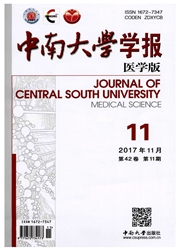

 中文摘要:
中文摘要:
目的:探讨神经生长因子调控哮喘气道神经源性炎症的信号转导通路。方法:36只SD大鼠随机分为正常对照组、哮喘组及抗NGF组。制作卵蛋白致敏大鼠哮喘模型,采用免疫组织化学方法观察正常大鼠和哮喘大鼠背根节和肺组织中pan-Ras,pERK,c-fos蛋白的表达,并以抗NGF抗体干预,了解其对哮喘大鼠pan-Ras,pERK,c-fos蛋白表达的影响。应用MAPK特异性抑制剂PD98059以及蛋白激酶C特异性激动剂PMA作用正常人支气管上皮细胞(NHBEC),免疫印迹法半定量检测Ras-MAPK信号转导途径中total-ERK,pERK及c-fos蛋白表达变化。结果:哮喘大鼠背根节及肺组织中pan-Ras,pERK,c-fos免疫反应较正常对照组大鼠明显上调(P〈0.01),经抗NGF干预后背根节和肺组织中pan-Ras,pERK,c-fos免疫反应较哮喘组大鼠明显减弱(P〈0.01)。免疫印迹结果显示NGF组磷酸化的ERK1/2蛋白及c-fos蛋白水平较正常对照组显著增高。PD98059可明显抑制ERK1/2的活化及c-fos蛋白的产生。PMA可刺激NGF诱导NHBEC表达磷酸化ERK1/2及c-fos蛋白。结论:NGF可能调控了哮喘神经源性炎症Ras-MAPK信号转导通路。
 英文摘要:
英文摘要:
Objective To investigate the regulatory effect of nerve growth factor ( NGF ) on Ras-MAPK signal transduction pathway in neurogenic inflammation of asthma. Methods Thirty-six Sprague-Dawley rats were randomly divided into 3 groups (control group, asthma group and anti-NGF group ). The asthmatic model was established by ovalbumin inhalation and injection. The protein expressions of pan-Ras, pERK and c-fos in the dorsal root ganglion and lung of the asthma group and the control group were examined by immunohischemical method. Anti-NGF antibody was used to investigate how it affected the protein expression of pan-Ras, pERK and c-fos in the dorsal root ganglion and the lung of the asthma group. PD98059 ( the inhibitor of MAPK) and PMA ( the enhancer of PKC) were used to culture the NHBEC. Cell extracts were analyzed for pERK, total-ERK and c-fos by Western blot. Results The protein expressions of pan-Ras, pERK and c-fos in the lung and dorsal root ganglion of the asthma group were significantly higher than those of the control group ( P 〈 0.01 ). The protein expressions of pan-Ras, pERK and c-fos were decreased by the anti-NGF treatment ( P 〈 0.01 ). The expressions of epithelial pERK and c-fos in the NGF group were significantly higher than those in the control group, and PD98059 could inhibit NGF inducing NHBEC to produce pERK and c-fos. PMA could enhance the effects of NGF. Conclusion NGF may play a role in the pathogenesis of neurogenic inflammation in asthma through Ras-MAPK signal transduction pathway.
 同期刊论文项目
同期刊论文项目
 同项目期刊论文
同项目期刊论文
 期刊信息
期刊信息
